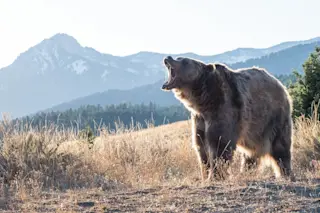Backpacking, camping and exploring the outdoors are great activities for mental and physical health. And, if done correctly, can be a safe and fun experience for you and the wildfire you may encounter.
Encountering a bear is rare, but it does happen. They are wild animals, and they can be dangerous. Just as you need plenty of water, suitable footwear, sunscreen and the appropriate layers to hike or camp in bear country, you'll also need to be aware of bears. According to the National Park Service, all bear encounters are also different, and should be treated with the respect they deserve.
While there are techniques that can help you prevent dangerous bear encounters, these techniques do not guarantee safety. If you encounter a bear, here is what you can do that may keep yourself and wildlife safe.
Bears are likely — but not always — skittish around humans. They will ...















